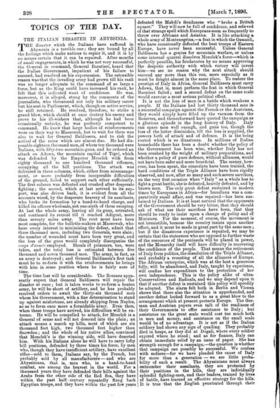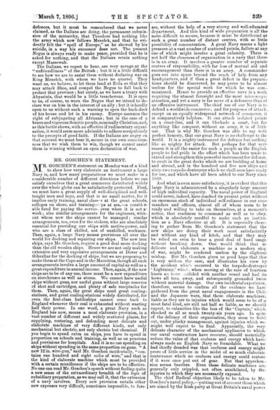TOPICS OF THE DAY.
THE ITALIAN DISASTER IN ABYSSINIA. THE disaster which the Italians have suffered in Abyssinia is a terrible one ; they are bound by all the feelings which make nations to repair it, and it is by no means certain that it can be repaired. After months of small engagements, in which he was not very successful, the General in command, General Baratieri, heard that the Italian Government, impatient of his failure to succeed, had resolved on his supersession. The ostensible reason was that the invading army had grown till his rank was no longer adequate to the command of so large a force, but as the King could have increased his rank, he felt that this indicated want of confidence. He was, moreover, it is alleged, stung by the comments of the journalists, who threatened not only his military career but his seat in Parliament, which, though on active service, he still retained. He resolved, therefore, to strike a grand blow, which should at once destroy his enemy and prove to his ill-wishers that, although he had been occasionally unlucky, he was perfectly competent to command. He knew that large bodies of reinforcements were on their way to Massowah, but to wait for them was also to wait for General Baldissera, and to risk the arrival of the rains which are almost due. He had dis- posable eighteen thousand men, of whom ten thousand were Italians, with fifty-two mountain-guns, and he ordered an attack on Adowa, the mountain capital of Tigr6, which was defended by the Emperor Menelek with from eighty thousand to one hundred thousand riflemen, occupying all the hill positions. The attack was delivered in three columns, which, either from mismanage- ment, or more probably from insuperable difficulties of the ground, failed to support each other sufficiently. The first column was defeated and crushed after desperate fighting ; the second, which at last arrived to its sup- port, was also driven back, it is evident from all the accounts wired, by the desperate bravery of its assailants, who broke its formation by a hand-to-hand charge, and killed its officers wholesale, not one-sixth of them escaping. At last the whole army, leaving all its guns, retreated, and continued its retreat till it reached Adigrat, more than seventy miles away. The rout must have been most complete, for the bulletin-makers at Massowab, who have every interest in minimising the defeat, admit that three thousand men, including two Generals, were slain ; the number of wounded must have been very great, and the loss of the guns would completely disorganise the corps d'armge employed. Shoals of prisoners, too, were taken, and the total loss is estimated between five thousand and seven thousand men. The army, in fact, as an army is destroyed ; and General Baldissera's first task must be to re-form it with the reinforcements he brings with him in some position where he is fairly sure of time.
The time lost will be considerable. The Romans appa- rently expect that General Baldissera will repair the disaster at once ; but it takes weeks to re-form a beaten army, he will be short of artillery, and he has probably received orders to await the thirty-six thousand men whom his Government, with a fine determination to stand up against misfortune, are already shipping from Naples, so as to form once more a formidable army. Even then, when these troops have arrived, his difficulties will be ex- treme. He will be compelled to attack, for Menelek is a General of sense and will not descend into the plain ; an attack means a march up hills, most of which are six thousand feet high, two thousand feet higher than Snowdon ; and the whole of his native allies, convinced that Menelek's is the winning side, will have deserted him. With his Italians alone he will have to carry lofty hill positions, defended by three times his force, by men who, though they have insufficient artillery, have excellent rifles—sold to them' Italians say, by the French, but probably sold by all manufacturers— and who are Abyssinians, that is, men who, in a hand-to-hand combat, are among the bravest in the world. For a thousand years they have defended their hills against the Arabs from the other side of the Red Sea, they have within the past half - century repeatedly flung back Egyptian troops, and they have within the past few years defeated the Mahdi's Soudanese who "broke a British square." They will now be full of confidence, and relieved of that strange spell which Europeans seem so frequently to throw over Africans and Asiatics. It is like attacking a whole army of Montenegrins,—a feat in which the Osmanli, who have occasionally defeated the best troops of Eastern Europe, have never been successful. Unless General Baldissera has a genius for mountain warfare, or unless. some internal quarrel dissolves Menelek's force—which is perfectly possible, his feudatories by no means approving the despotic authority with which victory will invest him—we see no reason why the next attack should succeed any more than this one, more especially as it must be fought almost in the same place. To restore the prestige of Italy in Africa, General Baldissera must carry Adowa, that is, must perform the feat in which General Baratieri failed ; and a second defeat on the same scale- would exercise a most serious political effect.
It is not the loss of men in a battle which weakens a. people. If the Italians had lost thirty thousand men in a successful campaign against the French or the Austrians, they would simply have filled up the vacuum from the Reserves, and thenceforward have quoted the campaign as a glorious episode in the long history of Italy. Italy can spare men well enough, and guns too, though the loss of the latter diminishes, till the loss is supplied, the powers both of attack and of defence. It is the being routed which is so disastrous. In millions of Italian households there has been a doubt whether the policy of the Government has been wise, whether Italy has not been crushed by the weight of military preparations, and whether a policy of pure defence, without alliances, would not have been safer and more beneficial. The money, how- ever, has been spent, the conscripts have been trained, the hard conditions of the Triple Alliance have been rigidly observed, and now, after so many and such severe sacrifices, on the very first occasion when " Italy " as a whole has to fight a great battle, she is defeated, heavily defeated, and by brown men. The only great defeat sustained in modern times by Europeans in Africa—for Isandlana was a com- paratively small affair, and was repaired—has been sus- tained by Italians. It is at least natural that the opponents of the Government should be very bitter, that they should ask of what use their sacrifices have been, that they should be ready to insist upon a change of policy and of Ministers. For the moment, of course, the movement is not irresistible, because the country insists upon another effort, and it must be made in great part by the same men ; but if the disastrous experience is repeated, we may be certain that the statesmen who are opposed to further waste of the resources of the peninsula will be placed in power, and the Monarchy itself will have difficulty in recovering the confidence of the people. That means the retirement of Italy from politics, the dissolution of the Triple Alliance, and probably a recasting of all the alliances of Europe. The African enterprise, which was at the best a generous. folly, will be abandoned, and Italy, taught by experience, will confine her expenditure to the protection of her own independence. This is the policy alike of ultra- Conservatives and Radicals, and we may depend upon it that if another defeat is sustained this policy will speedily be adopted. The alarm felt both in Berlin and Vienna shows that there also the situation is apprehended, and another defeat looked forward to as a great blow to the arrangement which at present protects Europe. The Ger- man and Austrian papers even talk of the readiness of their Governments to offer assistance to Italy ; but assistance on the great scale would cost too much both in men and money, and assistance on the small scale would be of no advantage. It is not as if the Italian soldiery had shown any sign of quailing. They probably died in heaps, as they did at Dogali, where every soldier expired where he stood ; and as for finance, Italy can obtain immediate relief by an issue of paper. She has strength enough for a campaign,—the question is whether that campaign can possibly be successful. We confess with sadness—for we have pleaded the cause of Italy for more than a generation — we see little proba- bility of such a result. The Abyssinians must always outnumber their assailants, they are protected by their positions in the hills, they are individually splendid fighting-men, and their leaders, trained by lives of battle, have learned an effective strategy for the hills. It is true that the English penetrated through their defences, but it must be remembered that we never claimed, as the Italians are doing, the permanent submis- sion of the monarchy, that Theodore had nothing like the army which now follows Meneleir, and that he evi- dently felt the "spell of Europe," as he showed by his suicide, in a way his successor does not. The present Negus is always ready to make peace, provided that he is asked for nothing, and that the Italians retain nothing except Massowah. The Italians, we regret to hear, are very savage at the " unfriendliness " of the British ; but it is a little difficult to see how we are to assist them without declaring war on Ring Menelek, with whom we have no quarrel. They want us, we believe, to let them land at Zeila so that they may attack Shoa, and compel the Negus to fall back to protect that province ; but surely, as we have a treaty with Abyssinia, that would be a little treacherous. It is open to us, of course, to warn the Negus that we intend to de- clare war on him in the interest of an ally ; but it is hardly open to us without such a warning to open the back-door of his house and let in his enemy. Europe assumes the right of subjugating all Africans ; but in the case of a brave and vigorous Semitic people, nominally Christian, and, as this battle shows, with an effective if rudimentary organi- sation, it would seem more advisable to adhere scrupulously to the precepts of good faith. If the Italians are angry on that account we must bear it, secure in our own conscious- ness that we wish them to win, though we cannot assist them in winning without an open declaration of war.







































 Previous page
Previous page